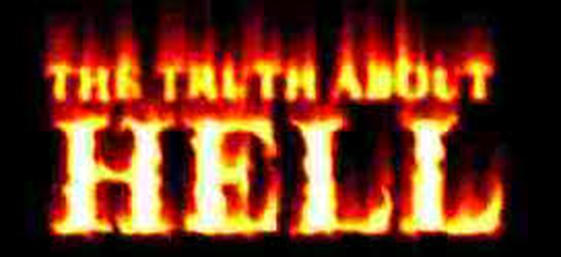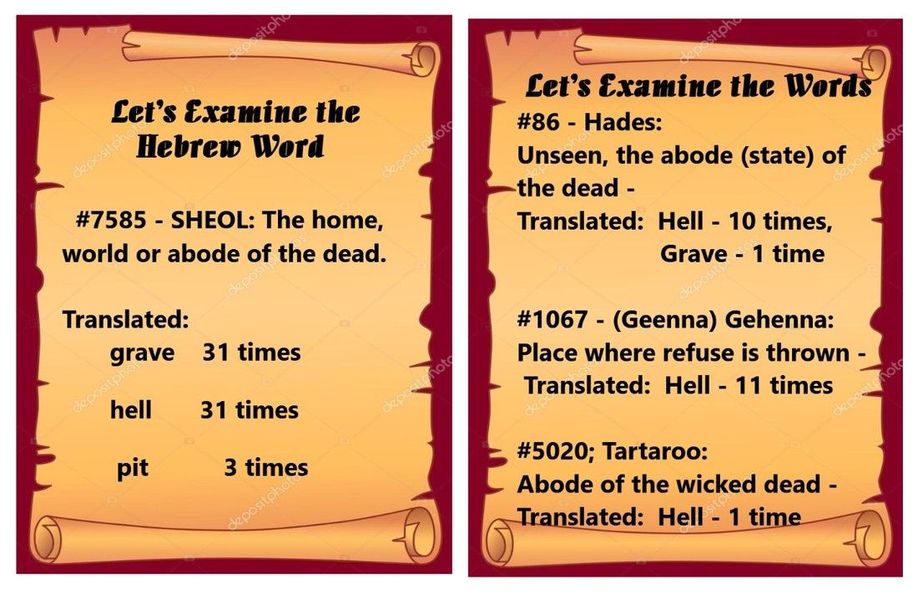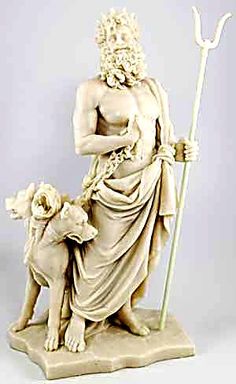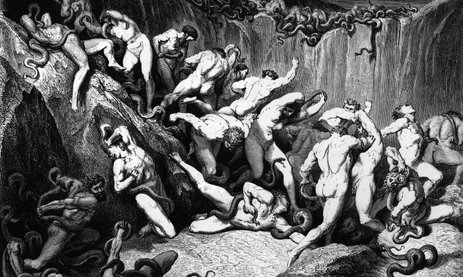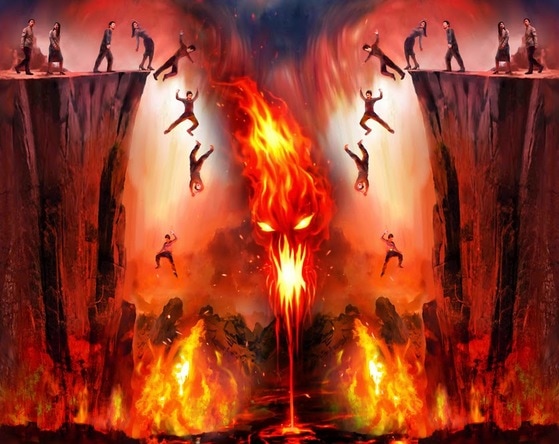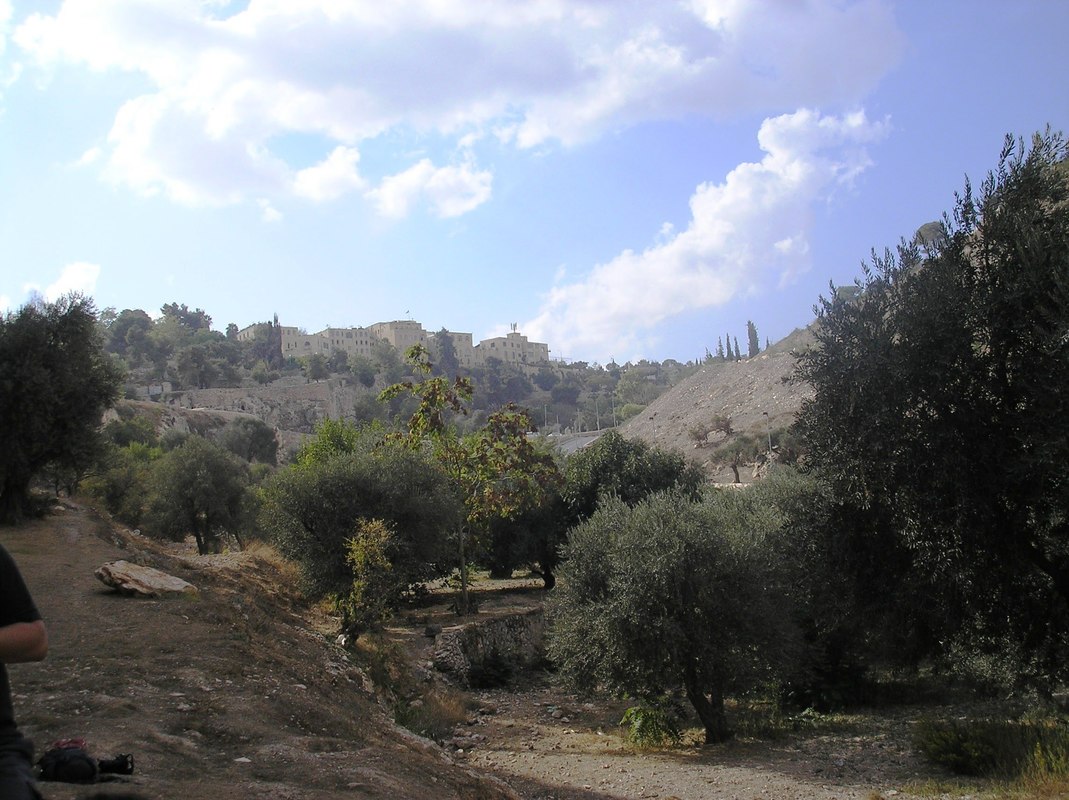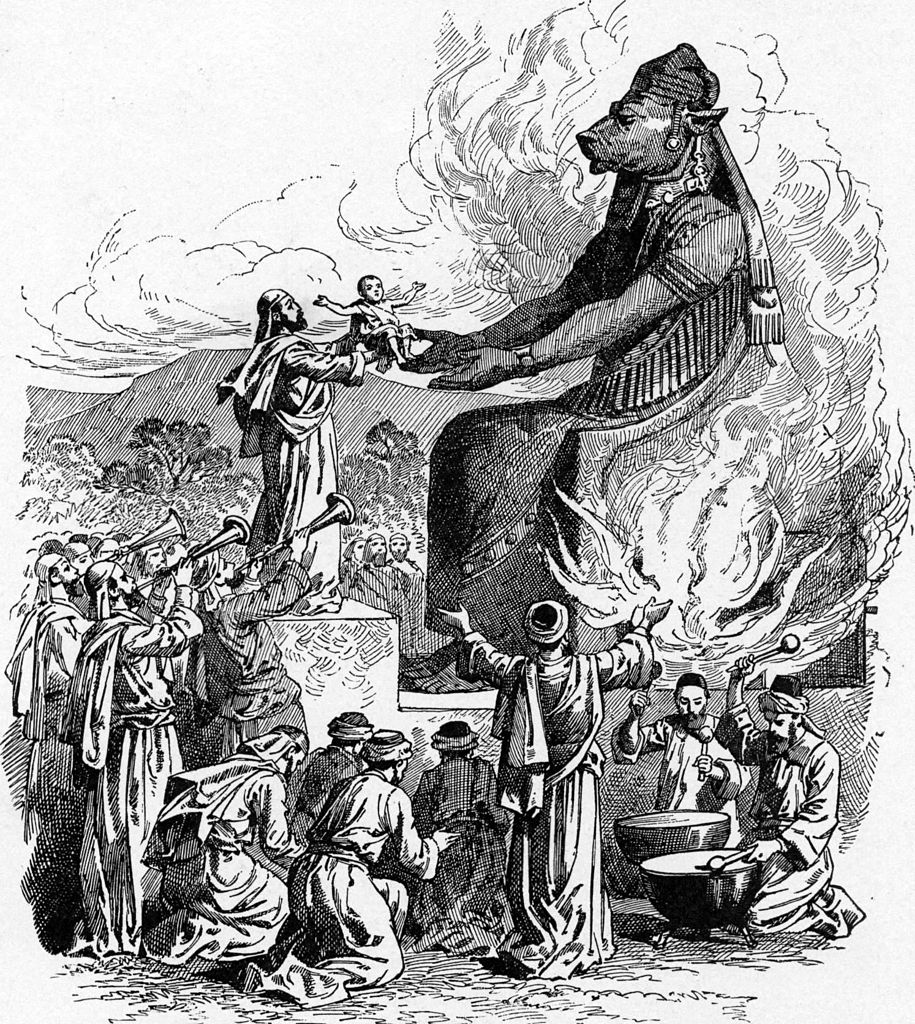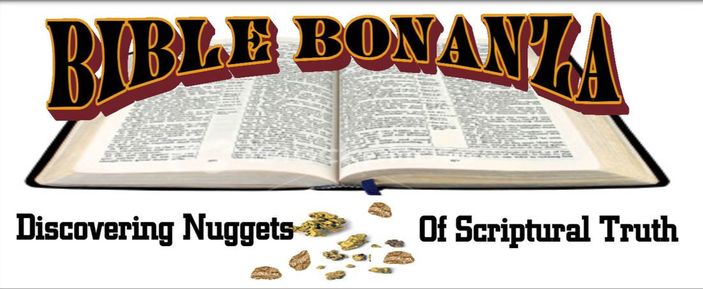Since the pagan concept of "hell" has been taught in churches for many centuries, it is understandable why The Encyclopedia American (1965 ed.) states, "Much confusion and misunderstanding has been caused through the early translators of the Bible persistently rendering the Hebrew Sheol and the Greek Hades and Gahenna by the word hell."
This confusion has been caused by inconsistent and erroneous translations which corrupted the truth of God's Word. This was due to the scare tactics devised by the church's to gain control of the people though fear.
This confusion has been caused by inconsistent and erroneous translations which corrupted the truth of God's Word. This was due to the scare tactics devised by the church's to gain control of the people though fear.
Check out these Scriptures
- Psalms 115:17; "The dead praise not the Lord, neither any that go down into silence."
- Eccl. 9:10; "...there is no work, nor device, nor knowledge, nor wisdom in the grave,
- whither thou goest."
- Psalms 6:5; "For in death there is no remembrance of thee; in the grave who shall give thee thanks?"
- Romans 6:7; "He who has died has been acquitted from his sin."
Other Passages to Consider
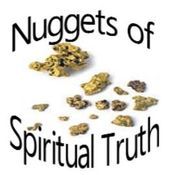
- God does not torment His creation in eternal fire because "God is love” 1 John 4:8. "He that loveth not knoweth not God; for God is love."
- Humans are made from dust. Genesis 2:7; "And the Lord God formed man of the dust of the ground, and breathed into his nostrils the breath of life; and man became a living soul." Genesis 3:19; "In the sweat of thy face shalt thou eat bread, till thou return unto the ground; for out of it wast thou taken: for dust thou art, and unto dust shalt thou return."
- When we die, our brain dies too, and our thoughts perish. Psalm 146:4; "His breath goeth forth, he returneth to his earth; in that very day his thoughts perish." Ecclesiastes 9:5; "For the living know that they shall die; but the dead know not any thing, neither have they any more a reward; for the memory of them is forgotten. Also their love, and their hatred, and their envy, is now perished; neither have they any more a portion for ever in any thing that is done under the sun."
- "Sheol" can be destroyed. Hosea 13:14; "I will ransom them from the power of the grave; [sheol] I will redeem them from death: O death, I will be thy plagues; O grave [sheol], I will be thy destruction: repentance shall be hid from mine eyes."
- There can be deliverance from "sheol" Psalms 116:3-4; "The sorrows of death compassed me, and the pains of hell [sheol] gat hold upon me: I found trouble and sorrow. Then call I upon the name of the Lord; O Lord, I beseech thee, deliver my soul." *hell = sheol
- Eternal torment would violate God’s justice. Deuteronomy 32:4; "He is the Rock, his work is (perfect:) for all his ways are judgment: a God of truth and without iniquity, just and right is he."
|
"Hades" = "Sheol" "Hades" = "Death"
The Greek word "hades" (unseen) is used to translate the Hebrew word "sheol"(out of sight, covered). Acts 2:27 states, "Because thou wilt not leave my soul in hell, [hades -unseen]neither wilt thou suffer thine Holy One to see corruption." This passage is a quote of Psalms 16:10 which says, "For thou wilt not leave my soul in hell; [sheol - out of sight, covered] neither wilt thou suffer thine Holy One to see corruption." This shows that the two words - one from Old Testament and the other from the New, are the same in meaning and usage.
These examples clearly show that the Greek word "hades" (like the Hebrew "sheol") represents death as opposed to life. Those in "hades" (hell), therefore, are dead, not alive as the false teaching of the churches depict. |
- Jesus states in Matthew 11:23 and Luke 10:15 that the wicked city of Capernaum (and its inhabitants) would be brought (cast) down to "hell" (hades).
- Acts 2:31 states that Christ was not left in "hell" (hades). Our righteous Savior Jesus was not to see corruption (dead in the grave). Note: the traditional mainstream churches who promote a hell of "fiery torment" would have our Savior and King Jesus in "hell" (hades). How absurd and blasphemous is that thought?
- Revelation 20:13 states, "And the sea gave up the dead which were in it; and death and "hell" [hades] delivered up the dead which were in them..." Apparently "hades" is associated with death and is not endless.
Old Testament People Talking About "Sheol"
*In all of the following verses, HELL, GRAVE AND PIT
are translated from the word SHEOL.
- David "For thou wilt not leave my soul in hell*; neither wilt thou suffer thine Holy One to see corruption." Psalms 16:10
- Jacob "For I will go down into the grave*..." Genesis 37:35
- Job "If I wait, the grave* is mine house: I have made my bed in the darkness." Job 17:13
- Job "They shall go down to the bars of the pit*, when our rest together is in the dust." Job 17:16
- King Hezekiah "...I shall go to the gates of the grave:* I am deprived of the residue of my years." Isaiah 38:10
- Jonah "Then Jonah prayed unto the Lord his God out of the fish's belly, and said, I cried by reason of mine affliction unto the Lord, and He heard me; out of the belly of hell* cried I, and thou heardest my voice." Jonah 2:1-2
Think About This:
None of these passages of Scripture indicate that "sheol" is a place of endless fiery torment of live people. That would be absurd. What is logical however, is that "sheol" is a place where both the righteous and the wicked die, are buried and covered up.
Those who insist that "sheol" (hell) is a place of endless fiery torment imply that Jacob, the father of the Israelites "an heir of salvation" (Hebrews 11) went to fiery hell as well as David, other patriarchs and even Jesus!
None of these passages of Scripture indicate that "sheol" is a place of endless fiery torment of live people. That would be absurd. What is logical however, is that "sheol" is a place where both the righteous and the wicked die, are buried and covered up.
Those who insist that "sheol" (hell) is a place of endless fiery torment imply that Jacob, the father of the Israelites "an heir of salvation" (Hebrews 11) went to fiery hell as well as David, other patriarchs and even Jesus!
What is the Origin of the Word "Hell"?
|
~~~Check it Out~~~
If you look in Webster's Twentieth Century Dictionary, Unabridged the English word "hell" comes from the Anglo-Saxon word "helan" which means "to cover, conceal." The word "hell" originally conveyed no thought of fire or torment, but simply a "covered or "concealed" place. In Old English dialect, the expression "helling potatoes" meant, not to roast them, but simply to cover the potatoes in the ground or in a cellar. |
Many people believe in a fiery hell, as shown in the religious artwork accompanying this article. However, the Bible teaches otherwise. Let us examine the diabolical doctrine of "hell" held by most churches. According to this false doctrine, God created a sub-terranean region called "hell" which is a fiery place where "unsaved souls" of the wicked are sent alive after death to be tormented with fire and pain forever. For centuries this despicable, unscriptural, mythological doctrine has been used to frighten people into subjection to "church" authority.
The use of the word "hell" by most churches is graphically portrayed in Dante's Divine Comedy and Milton's Paradise Lost. However, this concept is completely foreign to the Biblical definition of the word. The idea of a "fiery hell of torment" is found primarily among the pagan religions of ancient Persia (Babylon), Phoenicia, Egypt, Greece, and Rome. Although there are variations in detail, the main features of "hell" as perceived by these pagan cultures are basically the same as the views held by most of today's churches. In fact, the pagan concept of a "fiery hell of torment" where "immortal souls" suffer everlasting punishment is rigorously taught in many churches today.
Gehenna
|
Recent photo of the Valley of Gehenna
|
In the Hebrew Bible, Tophet or Topheth was a location in Jerusalem in the Gehinnom (Gehenna) valley where worshipers influenced by the ancient Canaanite religion engaged in the human sacrifice of their children to the gods Moloch and Baal by burning them alive from 10th - 6th century BC. Later this same valley was made into a dump where garbage and dead bodies were taken for disposal and destruction by burning.
|
Jeremiah 7:31 records Judah's pagan practice of burning their children in fire (an idolatrous act). "And they have built the high places of Tophet, which is in the valley of the son of Hinnom, to burn their sons and their daughters in the fire; which I commanded them not, neither came it into my heart". See also Jeremiah 32:35. These verses are wrongly used by professing Christians to incorrectly say that Jesus used "gehenna" to teach the pagan doctrine of "endless torment in fire." Rather, Jesus used the term "gehenna" symbolically to represent God's judgement on idolatrous behavior.
Both Jewish and Christian doctrines state Gehenna, also called Gehinnom, is the place of the damned. The imagery of burning humans supplied the concept of "hellfire" to their idolatrous doctrines.
Both Jewish and Christian doctrines state Gehenna, also called Gehinnom, is the place of the damned. The imagery of burning humans supplied the concept of "hellfire" to their idolatrous doctrines.
|
"And he [King Josiah of Judah] defiled [destroyed] Topheth which is in the valley of the children of Hinnom, that no man might make his son or his daughter to pass through the fire of Molech". II Kings 23:10
Other References to "Gehenna":
|
Tartaroo (Tartarus)
According to Pagan Mythology:
According to Pagan Mythology:
In Greek (Pagan) Mythology, Tartarus is both a deity and a place in the underworld even lower than Hades. Tartarus is often referred to as the place the "fallen angels" were thrown down into.
Below Heaven, Earth, and Pontus is Tartarus, or Tartaros (Greek 'deep place'). It is either a deep, gloomy place, a pit or abyss used as a dungeon of torment and suffering that resides within Hades or the entire underworld with Hades being the hellish component.
In the Gorgias, Plato (c. 400 BC) wrote that souls were judged after death and those who received punishment were sent to Tartarus.
Below Heaven, Earth, and Pontus is Tartarus, or Tartaros (Greek 'deep place'). It is either a deep, gloomy place, a pit or abyss used as a dungeon of torment and suffering that resides within Hades or the entire underworld with Hades being the hellish component.
In the Gorgias, Plato (c. 400 BC) wrote that souls were judged after death and those who received punishment were sent to Tartarus.
According to the Bible:
The phrase "cast down to hell" is translated only once from the single Greek word "tartaroo". It refers to a condition of debasement (to reduce from a higher state or rank), (spiritual darkness or spiritual death).
Read all of 2nd Peter2 for a better understanding of how Peter is using illustrations in an attempt to let the false teachers he is talking to know they will be thrown down, debased.
The phrase "cast down to hell" is translated only once from the single Greek word "tartaroo". It refers to a condition of debasement (to reduce from a higher state or rank), (spiritual darkness or spiritual death).
Read all of 2nd Peter2 for a better understanding of how Peter is using illustrations in an attempt to let the false teachers he is talking to know they will be thrown down, debased.
Let us Reason Together
|
Let us use our reasoning powers that God gave us to think this out. Is there ANY THING you can think of that your child could ever do to make you want to punish him for eternity in a fiery pit AND make it so he would feel all the torment forever? Me neither. So how is it that we could believe, even for a moment, that our God, who is a God of Love (1 John 4:8) made us with more compassion than what He possesses? I know I am not more forgiving, loving and compassionate than Him. Are YOU? |
Summary
Now that we have examined the use of the word "hell" in both the Old and New Testaments, we have found that the traditional doctrine of "hell-fire" which is taught by most mainstream Judeo-Christian churches is a product of pagan superstition derived from mythology which is directly opposed to the Truth of God's Word. The Hebrew word "sheol" and the Greek words "hades", "gehenna" and "tartaroo" which were translated into the English word "hell" all relate to the state of death and support each other in meaning and intent. No where does it relate to a place of endless fiery torment reserved for wicked souls.
The traditional meaning of "hell" as used and promoted by churches is in total contrast to what the Bible teaches. It is imperative that we understand the differences. The pagan doctrine of "a fiery eternal hell" is part of the scare tactics introduced years ago to people who could not read Scripture and find Truth for themselves. It was designed solely for the purpose of gaining control of the masses and their pocket books.
The traditional meaning of "hell" as used and promoted by churches is in total contrast to what the Bible teaches. It is imperative that we understand the differences. The pagan doctrine of "a fiery eternal hell" is part of the scare tactics introduced years ago to people who could not read Scripture and find Truth for themselves. It was designed solely for the purpose of gaining control of the masses and their pocket books.
May we shake off pagan mythology and dwell on the Truth of God's Holy Word.
Bob & Mary Lou Becker - {contact us by using the form at the bottom of our Home Page}
